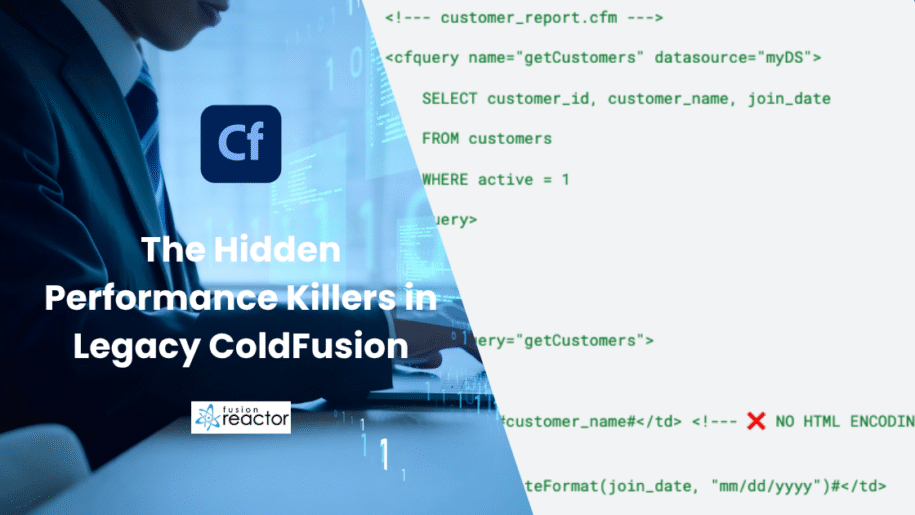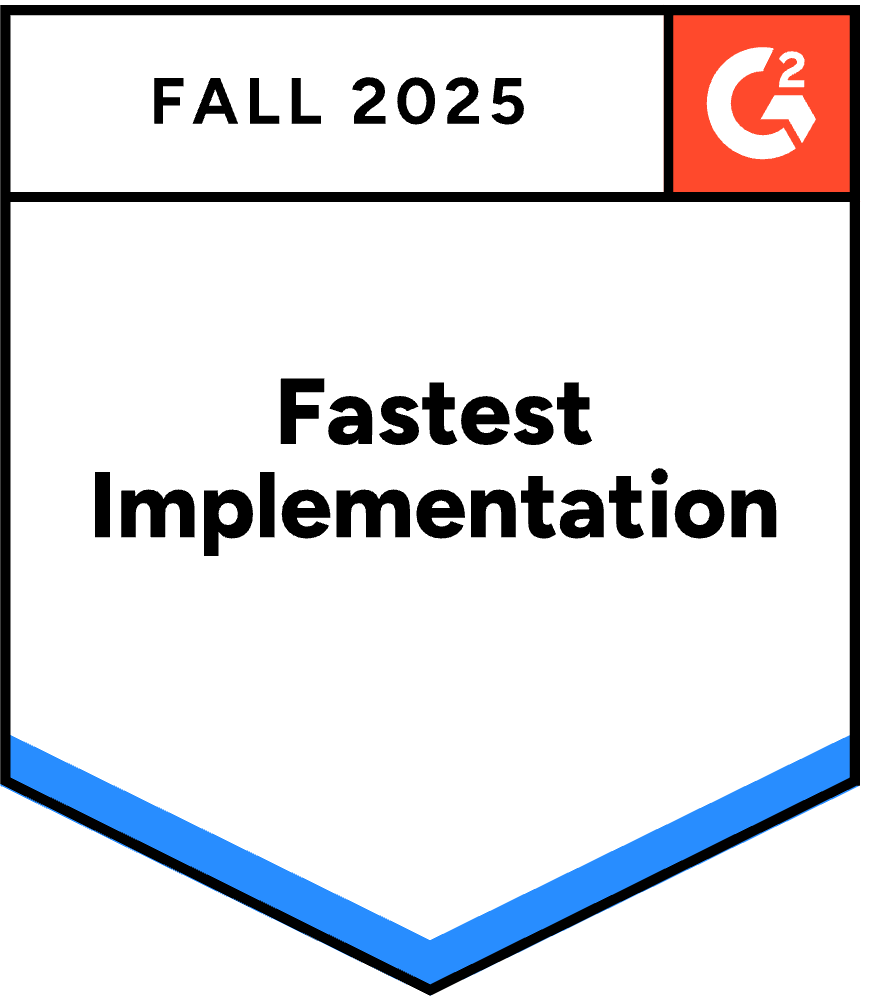Every ColdFusion developer has inherited “that” application. You know the one – it was built in 2008, has grown organically over the years, and now takes 30 seconds to load a simple report. The original developer left years ago, and the code is a maze of includes, inline queries, and session variables that would make even the bravest developer weep.
But here’s the thing: you might not even realize how bad it really is. Without proper monitoring, these performance killers often remain hidden, gradually degrading your application until it eventually fails.
Let’s explore the most common legacy ColdFusion patterns that destroy performance – and how FusionReactor exposes these hidden disasters.
The N+1 Query Nightmare
This is perhaps the most common performance killer in legacy ColdFusion applications. Here’s what it typically looks like:
cfml
<!--- customer_report.cfm --->
<cfquery name="getCustomers" datasource="myDS">
SELECT customer_id, customer_name, join_date
FROM customers
WHERE active = 1
</cfquery>
<table>
<cfloop query="getCustomers">
<tr>
<td>#customer_name#</td> <!--- ❌ NO HTML ENCODING - XSS RISK --->
<td>#dateFormat(join_date, "mm/dd/yyyy")#</td>
<!--- ❌ PROBLEM: Query inside loop - will run once per customer! --->
<cfquery name="getOrderCount" datasource="myDS">
SELECT COUNT(*) as order_count
FROM orders
WHERE customer_id = #customer_id# <!--- ❌ NO CFQUERYPARAM - SQL INJECTION RISK --->
</cfquery>
<td>#getOrderCount.order_count#</td>
<!--- ❌ PROBLEM: Another query in the loop! --->
<cfquery name="getTotalSpent" datasource="myDS">
SELECT SUM(order_total) as total_spent
FROM orders
WHERE customer_id = #customer_id# <!--- ❌ NO CFQUERYPARAM --->
</cfquery>
<td>#dollarFormat(getTotalSpent.total_spent)#</td>
<!--- ❌ PROBLEM: Yet another query in the loop! --->
<cfquery name="getLastOrder" datasource="myDS">
SELECT MAX(order_date) as last_order
FROM orders
WHERE customer_id = #customer_id# <!--- ❌ NO CFQUERYPARAM --->
</cfquery>
<td>#dateFormat(getLastOrder.last_order, "mm/dd/yyyy")#</td>
</tr>
</cfloop>
</table>
What FusionReactor Shows You:
- JDBC History: 1,001 queries for a 250-customer report
- Response Time: 15-30 seconds
- Database Time: 95% of total request time
- Thread visualization: Single thread blocked for entire duration
The real shock comes when you see FusionReactor’s JDBC log showing the same query pattern repeated hundreds of times. What looks like innocent code is actually hammering your database with unnecessary requests.
The Unparameterized Query Disaster
This pattern is both a performance killer and a security nightmare:
cfml
<!--- search.cfm --->
<cfset searchTerm = trim(form.searchTerm)>
<cfset category = form.category>
<cfset minPrice = form.minPrice>
<cfset maxPrice = form.maxPrice>
<cfquery name="searchResults" datasource="myDS">
SELECT * FROM products <!--- ❌ SELECT * retrieves unnecessary columns --->
WHERE 1=1
<cfif len(searchTerm)>
<!--- ❌ CRITICAL: Direct variable injection = SQL injection vulnerability --->
AND (product_name LIKE '%#searchTerm#%'
OR product_description LIKE '%#searchTerm#%')
</cfif>
<cfif len(category)>
<!--- ❌ More SQL injection risk --->
AND category = '#category#'
</cfif>
<cfif isNumeric(minPrice)>
<!--- ❌ Even numeric values should use cfqueryparam --->
AND price >= #minPrice#
</cfif>
<cfif isNumeric(maxPrice)>
AND price <= #maxPrice#
</cfif>
ORDER BY product_name
<!--- ❌ MISSING: No query caching, no pagination --->
</cfquery>
<!--- ❌ PROBLEM: What if someone submits:
searchTerm = "'; DROP TABLE products; --"
This could destroy your database!
--->
What FusionReactor Shows You:
- JDBC Query Cache: Zero cache hits (every query is unique)
- Database CPU: Spikes during search operations
- Query Execution Plans: Full table scans
- Security Alerts: Potential SQL injection vulnerabilities
FusionReactor’s JDBC monitoring will show you hundreds of similar-but-different queries, each requiring the database to create a new execution plan.
The Infinite Loop Special
Sometimes legacy code contains loops that can spiral out of control:
cfml
<!--- report_generator.cfm --->
<cfset startDate = "01/01/2010"> <!--- ❌ Hard-coded date --->
<cfset endDate = now()>
<cfset currentDate = startDate>
<!--- ❌ PROBLEM: This could loop for 15+ years of data! --->
<cfloop condition="currentDate LTE endDate">
<cfquery name="getDayData" datasource="myDS">
SELECT * FROM transactions
WHERE transaction_date = #createODBCDate(currentDate)#
<!--- ❌ No date range, gets ALL transactions for this date --->
</cfquery>
<!--- ❌ NESTED LOOP: For each transaction... --->
<cfloop query="getDayData">
<!--- ❌ ANOTHER QUERY: N+1 problem multiplied by days! --->
<cfquery name="getDetails" datasource="myDS">
SELECT * FROM transaction_details
WHERE transaction_id = #transaction_id# <!--- ❌ SQL injection risk --->
</cfquery>
<!--- More processing... --->
</cfloop>
<cfset currentDate = dateAdd("d", 1, currentDate)>
<!--- ❌ NO ESCAPE CLAUSE: What if this runs forever? --->
</cfloop>
<!--- ❌ CALCULATION:
15 years = ~5,475 days
If 100 transactions per day = 547,500 queries
Plus detail queries = 1,095,000+ total queries!
--->
What FusionReactor Shows You:
- Running Requests: Single request running for minutes/hours
- CPU Usage: Pegged at 100%
- Thread Dump: Stuck in nested loops
- Database Connections: All consumed by one request
FusionReactor’s ability to kill long-running requests becomes a lifesaver here.
The Global Variables Chaos
Legacy CF applications often treat variables like a free-for-all:
cfml
<!--- Throughout the application --->
<!--- ❌ PROBLEM: No variable scoping! --->
<cfset datasource = "myDS"> <!--- Is this local? Request? Application? --->
<cfset company_name = "ACME Corp">
<cfset admin_email = "admin@acme.com">
<cfset upload_path = "C:\uploads\"> <!--- ❌ Hard-coded Windows path --->
<!--- ❌ DANGEROUS: Dynamic variable creation from database --->
<cfquery name="getSettings" datasource="#datasource#">
SELECT * FROM settings
</cfquery>
<cfloop query="getSettings">
<!--- ❌ CRITICAL: Creating variables from database values! --->
<cfset "#setting_name#" = setting_value>
<!--- What if setting_name = "application" or "session"? --->
</cfloop>
<!--- Later in some random file --->
<!--- ❌ Where did tax_rate come from? When was it set? --->
<cfif tax_rate GT 0> <!--- ❌ Will error if tax_rate doesn't exist --->
<cfset total = subtotal * (1 + tax_rate)>
<cfelse>
<cfset total = subtotal> <!--- ❌ Where is subtotal defined? --->
</cfif>
<!--- ❌ PROBLEMS:
- Variable collisions between includes
- No way to track variable origin
- Race conditions in concurrent requests
- Memory leaks from accumulated variables
--->
What FusionReactor Shows You:
- Memory Profiler: Thousands of unscoped variables
- Variable tracking: Impossible to trace variable origins
- Race Conditions: Intermittent errors from variable collisions
- Performance: Slower variable resolution
The Session Variable Monster
Legacy CF applications love their session scope. Really, really love it:
cfml
<!--- application.cfm --->
<cfapplication name="MyApp" sessionmanagement="true" sessiontimeout="#CreateTimeSpan(0,8,0,0)#">
<!--- login.cfm --->
<cfquery name="getUserData" datasource="myDS">
SELECT * FROM users WHERE user_id = #form.user_id# <!--- ❌ SQL INJECTION RISK --->
</cfquery>
<!--- ❌ PROBLEM: Storing entire query result in session --->
<cfset session.user = getUserData>
<!--- ❌ PROBLEM: Caching ALL products for EVERY user session --->
<cfquery name="getAllProducts" datasource="myDS">
SELECT * FROM products <!--- ❌ No pagination, getting everything --->
</cfquery>
<cfset session.allProducts = getAllProducts>
<!--- ❌ PROBLEM: More unnecessary session data --->
<cfquery name="getAllCategories" datasource="myDS">
SELECT * FROM categories
</cfquery>
<cfset session.allCategories = getAllCategories>
<!--- ❌ CATASTROPHIC: Storing entire order history with joins! --->
<cfquery name="getOrderHistory" datasource="myDS">
SELECT o.*, oi.*, p.* <!--- ❌ SELECT * with multiple tables --->
FROM orders o
INNER JOIN order_items oi ON o.order_id = oi.order_id
INNER JOIN products p ON oi.product_id = p.product_id
WHERE o.user_id = #form.user_id# <!--- ❌ SQL INJECTION RISK --->
</cfquery>
<cfset session.orderHistory = getOrderHistory> <!--- ❌ Could be megabytes of data --->
<!--- ❌ PROBLEM: Unbounded array in session --->
<cfset session.shoppingCart = ArrayNew(1)>
What FusionReactor Shows You:
- Memory Profiler: Session sizes of 50-500MB per user
- Heap Memory: Constant growth, frequent garbage collection
- JVM Metrics: Old generation memory never decreasing
- User Experience: Random logouts when sessions get purged
You’ll see the memory graph climbing steadily throughout the day, with massive garbage collection pauses that freeze the entire application for seconds at a time.
The Include File Maze
Legacy CF loves its includes, creating a tangled web of dependencies:
cfml
<!--- index.cfm --->
<cfinclude template="header.cfm"> <!--- ❌ No error handling if file missing --->
<cfinclude template="check_login.cfm">
<cfinclude template="get_user_preferences.cfm">
<!--- header.cfm --->
<cfinclude template="site_settings.cfm"> <!--- ❌ Nested includes begin... --->
<cfinclude template="navigation.cfm">
<cfinclude template="user_menu.cfm">
<!--- navigation.cfm --->
<cfinclude template="get_menu_items.cfm"> <!--- ❌ Even more nesting --->
<cfinclude template="check_permissions.cfm">
<!--- get_menu_items.cfm --->
<cfquery name="getMenuItems" datasource="myDS">
SELECT * FROM menu_items WHERE active = 1 <!--- ❌ Query in an include --->
</cfquery>
<cfinclude template="format_menu.cfm"> <!--- ❌ 4 levels deep now! --->
<!--- ❌ PROBLEMS:
- Impossible to trace execution flow
- Each include could modify global variables
- Error in any file breaks everything
- No way to unit test individual components
- Performance hit from file system operations
--->
What FusionReactor Shows You:
- Error Rate: Often 0% (because errors aren’t being tracked!)
- But dig deeper and you’ll find:
- Slow transactions with no apparent cause
- Memory spikes from repeated failed operations
- Database connections being held open
- Email queues backing up
The most insidious part? Your application appears to be running fine, but FusionReactor’s deep transaction tracking reveals constant failures being silently ignored.
The Real Cost of Legacy Code
When you add up all these patterns in a single application (and most legacy apps have ALL of them), FusionReactor reveals a terrifying picture:
- Response Times: 10-30 seconds for simple operations
- Memory Usage: Growing continuously until OutOfMemory errors
- Database Load: 100x more queries than necessary
- Error Rates: Hidden failures causing data inconsistencies
- Scalability: Unable to handle more than a few concurrent users
The Path Forward
The first step in escaping legacy code hell is understanding just how severe the situation really is. FusionReactor provides you with that visibility, showing not just that your application is slow, but also exactly why it’s slow and where to focus your modernization efforts.
Without this visibility, you’re fighting blind. You might spend weeks optimizing code that isn’t even the real bottleneck. But with FusionReactor’s insights, you can:
- Identify the worst offenders – Which pages/operations cause the most pain
- Understand the impact – How these issues affect real users
- Prioritize fixes – Focus on changes that will deliver the most value
- Measure improvements – Prove that your modernization efforts are working
Don’t Let Legacy Code Win
Legacy ColdFusion applications don’t have to be a life sentence. Yes, the code examples above are painful to look at (and even more painful to maintain). Still, with proper monitoring and a strategic approach to modernization, you can transform these applications into something maintainable and performant.
The key is visibility. You can’t fix what you can’t see, and FusionReactor illuminates every dark corner of your legacy application.
Is your legacy ColdFusion application holding your business back? Start a FusionReactor trial today and discover what’s really happening under the hood. The results might shock you – but they’ll also show you the path forward. If you are looking to upgrade your version of ColdFusion, then visit our sister site Buy-Adobe-Software.com.










